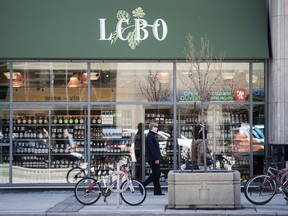Michael Taube: The Ontario government needs to get out of the booze business
Doug Ford should expand on recent modernizations in alcohol sales by privatizing the LCBO

Article content
Ontario Premier Doug Ford and his Progressive Conservative government recently announced that convenience stores in the province will be able to sell wine, beer, cider and pre-mixed cocktails by 2026. It’s a good decision, but why stop there? Ford should go even further and privatize the Liquor Control Board of Ontario.
It’s a step that no Ontario government has been willing to take since the LCBO was founded in 1927. PC governments under then-premiers Mike Harris and Ernie Eves both briefly toyed with LCBO privatization, but didn’t pursue it vigorously. Then-Liberal finance minister Greg Sorbara ordered a review of the Crown corporation’s liquor distribution model, but quickly rejected former LCBO board member John Lacey’s July 2005 report that was more supportive of privatization over public ownership.
Why will Ontario not follow through on liquor retail privatization? Fear of voter retaliation, for the most part.
Left-leaning Ontario premiers have mostly refused to consider reforming this valuable asset, which reported revenues of $7.21 billion and a net income of $2.54 billion in 2020-21. They also go out of their way to show voters how much they support the more than 8,000 unionized employees of the near century-old Crown corporation. Right-leaning premiers also recognize that the LCBO is a cash cow. They worry about their poll numbers if they choose to target it because some Ontarians (and potential voters) view it as a sacred institution that capitalists should leave alone.
Yet, it’s ridiculous that Ontario is in the booze business in the first place. If you believe in concepts like a free market economy, private enterprise and the need to enhance consumer choice, a publicly funded LCBO doesn’t make a lick of sense. And anyone with a rudimentary understanding of economics would know the only reason that the LCBO has reaped these profits is because it exists in a (mostly) non-competitive marketplace without real, serious private competition.
Ford and the Ontario PCs should therefore examine other provincial models related to the privatization of beer, wine, cider and spirits in different venues. It could help them get new ideas, learn from past mistakes and serve as a form of inspiration to devise their own privatization model — and hopefully do it as well or better.
Alberta is the best place to start. Then-premier Ralph Klein deregulated the public monopoly in alcohol in 1992, and the province has never looked back. University of Alberta economics professor Doug West made some important observations about Alberta’s shift to privatization in a few Fraser Institute papers. This includes: overall product selection of beer, wines and spirits doubled with liquor privatization, retail liquor prices fell on average and basically followed wholesale price adjustments, full-time equivalent employment levels nearly tripled in more than a decade, and there was an astonishing 134 per cent increase in the number of Alberta-based liquor stores.
West also noted that Alberta government revenues increased after Klein introduced liquor privatization. Whereas the province made $427 million from its government monopoly in alcohol in 1992, those revenues soared to about $540 million in liquor taxes from private outlets in 2002. These profits continue today, and it’s something that Ontario could take advantage of by bringing an end to the LCBO.
B.C. has also engaged in some liquor privatization experiments, but the results have often resembled a yo-yo. Liberal premier Gordon Campbell, for instance, seemed ready to follow Alberta’s lead in 2001 and proposed privatizing up to 90 per cent of his province’s liquor-retailing industry. Alas, the public sector unions fought back and it never moved forward. No premier has investigated it since.
B.C. also introduced private liquor retail stores back in 1988. This proved to be successful in increasing consumer choice and available options for wine, beer and spirits. Unfortunately, the window of opportunity for investors to apply for a private liquor store licence in the province has been closed more often than it’s been open. Most recently, the NDP government announced in 2021 that the moratorium on applications and approvals would be extended to July 2032.
As Mark Milke nicely put it in an Aug. 19, 2013 Business in Vancouver column, “There has always been a grand degree of irony that British Columbia, the most liberal province in Canada, has an approach to liquor retailing that was born in Prohibition and survives because of special-interest pressure.” Little has changed in Lotusland, it seems.
Meanwhile, Manitoba has allowed private wine shops and private beer retailers to operate in the province for years. Nova Scotia announced a trial program for private wine shops and specialty stores in 2002, some of which still exist and thrive today. Even Quebec, which has a public liquor monopoly, Société des alcools du Québec (SAQ), gradually allowed wine and beer to be sold in grocery stores.
While Ontario has already done some of these smaller experiments, it needs to do more.
Ford, to his credit, has attempted to change the Ontario model by ending the Beer Store monopoly within five years and introducing the buck-a-beer program. When he announced his forthcoming changes to beer, wine and other alcohol in convenience stores, he said, “we made a promise to the people of Ontario to deliver more choice and convenience.” Privatizing the LCBO would bring him even closer to that important promise he needs to keep.
National Post


Postmedia is committed to maintaining a lively but civil forum for discussion. Please keep comments relevant and respectful. Comments may take up to an hour to appear on the site. You will receive an email if there is a reply to your comment, an update to a thread you follow or if a user you follow comments. Visit our Community Guidelines for more information.